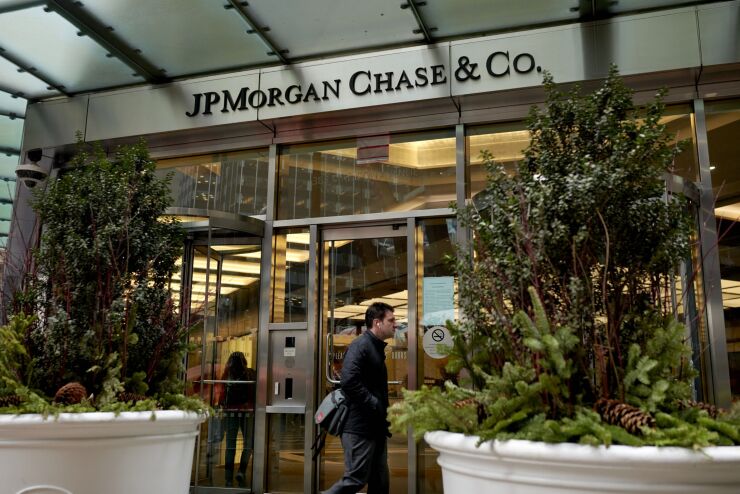
UPDATE: This article includes quotes from CEO Jamie Dimon and details shared during JPMorgan's earnings call.
Credit remains a sticking point for
The largest U.S. bank by assets reported a steep year-over-year increase in credit costs, as it sought to cover a surge in net charge-offs and added $1 billion in loan-loss reserves.
During a conference call to discuss third-quarter results, Chief Financial Officer Jeremy Barnum said the company expects that financial results in coming quarters "will be somewhat challenged as normalization continues."
"But we remain upbeat and focused on executing in order to continue delivering excellent returns through the cycle," Barnum told analysts.
Barnum in July had characterized credit losses as a "
For the third quarter, the megabank's provision for credit losses more than doubled to $3.1 billion, from $1.4 billion in the year-ago quarter. Net charge-offs for the three months ended Sept. 30 were $2.1 billion, up 40% year over year and largely driven by card services,
The majority of net charge-offs occurred in
Despite signals that the U.S. economy is improving,
Still, it maintained its guidance for a full-year net charge-off rate in cards to be about 3.4%. In 2023, the rate was 1.02%.
Overall, the higher provision put a crimp in
Revenue for the period was $43.3 billion, up 6% from the year-ago quarter. Net interest income was a factor, up 3% for the quarter, while noninterest income rose 11%, the bank said.
Fee income included a 29% increase in investment banking revenues.
Full-year expenses, excluding legal fees but including a special assessment by the Federal Deposit Insurance Corp. and a contribution to the firm's foundation, are now forecast to be $91.5 billion, about half a billion dollars less than what it laid out this summer.
Analysts during Friday's earnings call tried several times to get a better sense of how
Last month, at a conference, President and Chief Operating Officer
At that time, consensus estimates for 2025 include $90 billion in net interest income and $93.7 billion in expenses. On Friday, Barnum said $87 million, which excludes markets, is "definitely in the ballpark" of where the bank is projecting next year's net interest income to land.
The bank is also projecting that net interest income will trough sometime mid-year, he said.
"Obviously, the mix of those things will play out in different ways, and … who knows what the yield curve will wind up doing," Barnum said. "But on our current assumptions, on the current yield curve, and remembering that we're in the third quarter now … that's what we think."
As the 68-year-old CEO focuses on succession planning, here's a look at some of the longtime JPMorgan executives who could succeed him.
Chairman and CEO Jamie Dimon was audibly frustrated by the net interest income questions, saying that "next time, let's just give [analysts] the damn number."
"I don't want to spend all the time on these calls going through what they're guessing what [net interest income] is going to be next year," Dimon said. "And can I just also point out that [net interest income], all things being equal, is a number, but all things are never equal."
Overall,
Wall Street seemed to like what
Like other banks,
But it has not yet been released for comment. The original proposal, which was made public in July 2023, was harshly criticized by banks and other groups for being too onerous on capital requirements.
"We actually just really need to [see] the proposal because the details matter a lot for this stuff," Barnum told analysts. "And so our focus is on hoping to see the proposal, so that we can process the details and continue advocating as appropriate."






